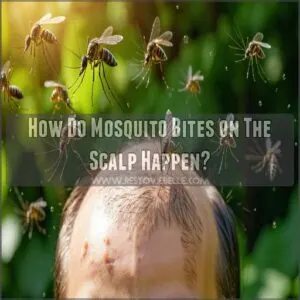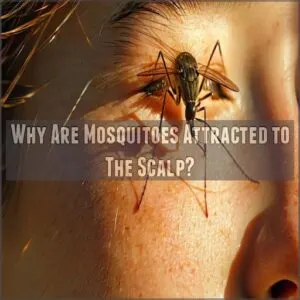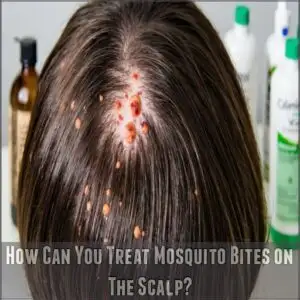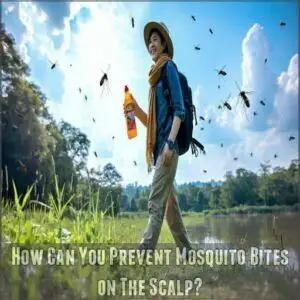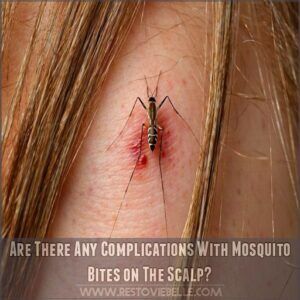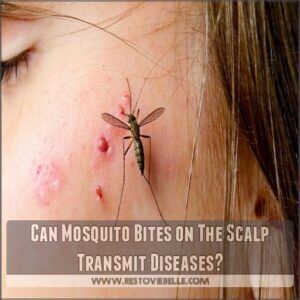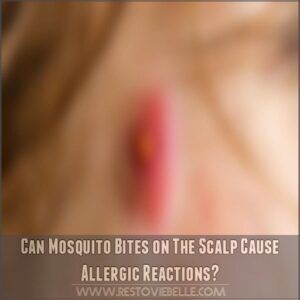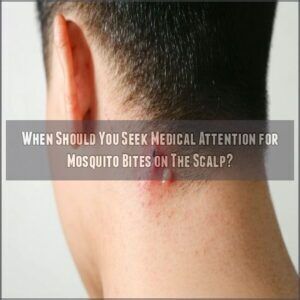This site is supported by our readers. We may earn a commission, at no cost to you, if you purchase through links.
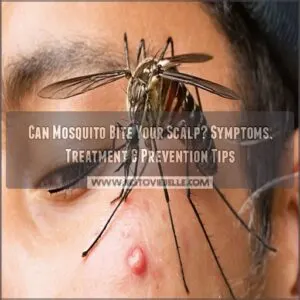 Yes, mosquitoes can bite your scalp, especially if you’ve got exposed skin due to thinning hair or bald spots. They’re drawn to the warmth and carbon dioxide your head gives off, as well as your body’s scent.
Yes, mosquitoes can bite your scalp, especially if you’ve got exposed skin due to thinning hair or bald spots. They’re drawn to the warmth and carbon dioxide your head gives off, as well as your body’s scent.
While hair acts as a natural barrier, those pesky mosquitoes can find their way to vulnerable areas.
Bites on the scalp can cause intense itching, tender bumps, and redness—a real headache, literally.
To prevent this, consider wearing a hat, using mosquito repellent, or keeping your scalp dry, as sweat attracts them. Stay vigilant, because mosquitoes don’t care if your hair is on point!
Table Of Contents
- Key Takeaways
- How Do Mosquito Bites on The Scalp Happen?
- Why Are Mosquitoes Attracted to The Scalp?
- What Are The Symptoms of Mosquito Bites on The Scalp?
- How Can You Treat Mosquito Bites on The Scalp?
- How Can You Prevent Mosquito Bites on The Scalp?
- Can Mosquito Bites on The Scalp Be Confused With Head Lice?
- Are There Any Complications With Mosquito Bites on The Scalp?
- Can Mosquito Bites on The Scalp Transmit Diseases?
- Can Mosquito Bites on The Scalp Cause Allergic Reactions?
- When Should You Seek Medical Attention for Mosquito Bites on The Scalp?
- Frequently Asked Questions (FAQs)
- Do mosquitoes bite on the scalp?
- What does a mosquito bite look like?
- How to prevent mosquito bites on the scalp?
- Can mosquitoes eat your scalp?
- What does it mean if a mosquito bite swells on your scalp?
- Can a mosquito bite your scalp if you don’t wear a hat?
- Why do mosquitoes bite my scalp?
- What happens when a mosquito bites on your head?
- Can you get a bug bite on your scalp?
- Do certain shampoos attract or repel mosquitoes?
- Conclusion
Key Takeaways
- Mosquitoes can bite your scalp, especially if you have bald spots or thinning hair, as they’re drawn to exposed skin, heat, and carbon dioxide.
- Hair provides some protection, but damp or sweaty conditions make your scalp more attractive to mosquitoes.
- You can prevent bites by wearing a hat, using mosquito repellent, and avoiding dark or wet hair, which attract mosquitoes.
- Treat bites with cold compresses, antihistamines, or hydrocortisone cream to reduce itching and swelling effectively.
How Do Mosquito Bites on The Scalp Happen?
Wondering if mosquitoes can bite your scalp? They can, but it’s not their first choice. Hair coverage acts as a natural barrier, though thinning hair or bald patches give mosquitoes easier scalp access.
Here’s the deal: mosquitoes are clever in their approach to finding exposed skin. Even through hair, they can detect carbon dioxide and heat, drawn to those tiny bald spots or parted hair. Damp, warm hair after exercise or a shower can also make you a target.
Their bite mechanics skip hairy areas unless they’re desperate for a meal. Mosquito bites on the scalp are rare but still happen, especially if your head gets sweaty or hot. Using a mosquito repellent can be an effective way to prevent bites. Protecting exposed skin is key to avoiding those itchy surprises.
Why Are Mosquitoes Attracted to The Scalp?
You’ll be surprised to learn that those pesky mosquitoes are drawn to your scalp because of the carbon dioxide you exhale and the heat your head produces.
If you’ve got thinning hair or a bald spot, you’re even more likely to attract these buzzing visitors since they love exposed skin that’s warm and easily accessible, particularly exposed skin.
Carbon Dioxide
Your breath gives you away to mosquitoes every time you exhale. These pesky insects have sophisticated Mosquito Sensors that zero in on the carbon dioxide you produce.
Here’s how their CO2 Levels detection works: Their antennae pick up Atmospheric Pressure changes from your breathing, they can detect carbon dioxide from up to 50 meters away, your respiration rate increases their attraction, body heat amplifies the CO2 signal they receive.
- Their antennae pick up Atmospheric Pressure changes from your breathing
- They can detect carbon dioxide from up to 50 meters away
- Your respiration rate increases their attraction
- Body heat amplifies the CO2 signal they receive
Body Odor
Think of your body odor as a unique scent signature that mosquitoes can’t resist.
Your sweat chemistry and bacterial growth on the skin create distinctive odor types that these pesky insects have evolved to detect.
The combination of apocrine sweat glands and skin bacteria produces lactic acid and other compounds that act as powerful mosquito attractants, making some people more appealing targets than others.
Colors
Beyond body chemistry, mosquitoes are surprisingly picky about color attraction. Dark colors act like a beacon, making you stand out in their visual field.
While light shades help you blend into the background, dark hues can make you an easy target.
- Black clothing stands out against the afternoon sky
- Navy blue and deep red attract twice as many mosquitoes
- White and khaki naturally camouflage you
- Light-colored hats provide better scalp protection
- Pastels and neutrals reduce your visual attractiveness
Heat and Water Vapor
While colors play their part, your body’s heat and water vapor act like a homing beacon for mosquitoes.
These pesky insects have specialized sensors that detect both heat sources and humidity levels around your scalp.
When you’re sweating or have just washed your hair, the moisture and warmth create an irresistible target.
Your scalp’s natural temperature, typically warmer than other body parts, combined with water vapor from perspiration, makes it particularly attractive to these heat-seeking biters.
Learning
Just like seasoned food critics who remember their favorite restaurants, mosquitoes develop preferences for certain hosts based on past experiences.
These clever insects can actually learn which people make the tastiest meals by remembering specific scents and behaviors.
If you’ve had mosquito bites on your scalp before, these persistent pests might remember and return for seconds, especially if you have exposed areas they’ve successfully targeted previously.
Alcohol
Having a few beers at your backyard BBQ? You’re sending out a mosquito invitation. Your drinking habits affect more than just potential hangover symptoms – alcohol raises your body temperature and increases carbon dioxide output, making you a prime target for scalp-hunting mosquitoes.
- Blood thinners in alcohol make bites bleed more easily
- Intoxication levels impact your awareness of incoming mosquitoes
- Beer consumption specifically attracts 25% more mosquitoes
- Higher body temperature from drinking creates an irresistible heat signature
Keep antihistamines handy – you might need them more than usual after outdoor drinking sessions.
Pregnancy
During pregnancy, your body temperature rises and you exhale more CO2, making you a prime target for mosquitoes – even on your scalp.
For effective maternal health and fetal protection, don’t skip the bug spray.
Safe options like picaridin or DEET (up to 30%) work well for prenatal care.
If you’re worried about mosquito bites scalp symptoms, wear a hat and light-colored clothing outdoors.
What Are The Symptoms of Mosquito Bites on The Scalp?
Just like bites elsewhere, mosquito bites on your scalp can drive you crazy with their persistent itch. When these pesky insects find their way through your hair, they leave behind telltale signs that are hard to ignore. Your scalp’s natural sensitivity makes these symptoms particularly noticeable.
Here’s what you’ll typically experience with mosquito bites scalp symptoms:
- An intense, persistent itch that’s frustratingly difficult to reach through your hair
- Small, raised bumps that feel tender when you’re washing or brushing your hair
- Noticeable redness around the bite area, which might be visible at your hairline
- Mild swelling that can create a strange sensation when moving your hair
- A warm, burning feeling that can last for several hours after the bite
These skin inflammation signs usually peak within 24 hours, making scalp irritation management a priority for quick relief.
How Can You Treat Mosquito Bites on The Scalp?
Feeling that annoying itch on your scalp? Mosquito bites on the scalp can drive you crazy, but relief is only a few steps away. Here’s how to handle it like a pro:
- Cold Compress: Grab an ice pack or a cold, damp cloth and press it onto the bite. It reduces swelling and provides quick itch relief.
- Skin Soothers: Calamine lotion or aloe vera gel are lifesavers for calming irritation.
- Scalp Creams: Over-the-counter hydrocortisone creams work wonders for reducing redness and itching.
- Anti-Itch Remedies: Oral antihistamines like Benadryl can help with persistent bites, especially if there’s an allergic reaction.
- Home Remedies: Mix baking soda and water into a paste, gently apply it, and rinse. It’s a quick, effective mosquito bite scalp treatment!
Understanding hair growth signs is also essential in distinguishing between a normal itchy scalp and one that may be experiencing new hair growth.
How Can You Prevent Mosquito Bites on The Scalp?
Protecting your scalp from mosquito bites isn’t rocket science, but it does take a bit of smart planning. Since the scalp can be a tricky spot to guard, use these prevention methods to stay bite-free:
- Cover up: Wear a hat or scarf to shield your scalp, especially in mosquito-heavy areas.
- Use mosquito repellents: Apply an insect repellent safe for your skin and hairline, focusing on exposed areas.
- Choose lighter colors: Mosquitoes love dark tones; stick to light shades to make yourself less of a target.
- Stay dry: Sweat and damp hair attract mosquitoes due to heat and water vapor.
- Avoid stagnant water: Limit time near mosquito breeding grounds to reduce exposure.
Additionally, considering sunscreen application methods can also help protect the scalp from other environmental factors.
Taking these steps can help keep your scalp safe and irritation-free.
Can Mosquito Bites on The Scalp Be Confused With Head Lice?
How can you tell if that itching on your scalp is from mosquito bites or head lice? Both can cause similar symptoms like scalp itching and red bumps, but the differences lie in the details.
Mosquito bites on the scalp often appear as isolated, raised bumps with bite mark differences, typically found on exposed or bald areas.
Head lice, on the other hand, leave nits (tiny white eggs) attached to hair shafts and cause a more persistent itching sensation due to their movement and bites. Location comparison is key—lice tend to stick to the hair roots, while mosquito bites are on the exposed skin.
Prevent secondary infections by avoiding scratching and using targeted prevention methods to deal with either problem effectively.
Are There Any Complications With Mosquito Bites on The Scalp?
Mosquito bites on the scalp might seem harmless at first, but scratching too much could spell trouble. That pesky itch? It’s not just annoying—it can lead to skin irritation, hair loss, or even a mosquito bite scalp infection if the skin breaks. Excessive itching opens the door for bacteria, upping the risk of redness, swelling, and those painful secondary infections. Plus, if you’re prone to Skeeter Syndrome (that allergic reaction to mosquito saliva), scalp mosquito bites might swell like crazy, leaving you with a truly frustrating situation.
- Risk of bacterial infections from scratching too much.
- Possible allergic reactions, like severe swelling and itching.
- Hair loss due to scalp irritation and follicle damage.
- Increased discomfort affecting sleep or focus.
- Sensitive skin prone to further irritation.
Can Mosquito Bites on The Scalp Transmit Diseases?
Getting bitten on the scalp? Annoying, but is it dangerous? The risk of disease transmission from mosquito bites to the scalp is possible but low.
Mosquitoes carry illnesses like dengue, Zika virus, and West Nile disease. When they bite exposed areas—yes, even your scalp—they can inject saliva that might contain harmful pathogens. However, scalp bites tend to be less common than bites on arms or legs, where skin exposure is higher.
The real risk depends on where you live or travel. Mosquitoborne diseases thrive in regions with warm weather and stagnant water.
To reduce scalp bite infections, wear hats, use repellents, and avoid peak mosquito hours. Protecting your scalp from UV protection is also important for overall scalp health. Protect your scalp; you’ll thank yourself later when those West Nile worries don’t become reality.
Can Mosquito Bites on The Scalp Cause Allergic Reactions?
Sometimes a mosquito bite isn’t just itchy—it can lead to an allergic reaction, and the scalp isn’t immune. Scalp sensitivity makes allergic responses to bites especially frustrating.
Ever felt an itch at the top of your head only to find redness or swelling that won’t quit? That’s your body reacting to allergens in mosquito saliva.
Most cases trigger itching and redness, but hypersensitivity can cause more severe reactions like blisters and widespread swelling. For allergy relief options, consider consulting a healthcare professional for guidance.
These reactions vary depending on individual responses, with people prone to allergies facing heightened risks. The scalp’s blood supply can make itching worse, adding to your discomfort.
If you suspect a mosquito bite scalp allergic reaction, antihistamines or soothing creams can quickly calm those pesky mosquito bite scalp symptoms.
When Should You Seek Medical Attention for Mosquito Bites on The Scalp?
You might chalk up an itchy scalp to just another mosquito bite, but there are times it’s more than that.
Watch for infection signs like unusual swelling, redness that won’t quit, or warmth around the bite—these could mean a mosquito bite scalp infection.
A severe allergic reaction, marked by fever, chills, or scalp swelling, is your cue to see a doctor ASAP.
Persistent symptoms that don’t improve with mosquito bite scalp treatment, like antihistamines or hydrocortisone, might signal a secondary infection or underlying issue. If blisters or lesions appear, don’t scratch—it increases infection risks.
Effective scalp infection treatment requires prompt medical attention to prevent further complications. And if mosquito bites scalp allergic reaction symptoms feel extreme or spread, medical attention isn’t optional. Know when to call for backup—it’s always better to be safe.
Frequently Asked Questions (FAQs)
Do mosquitoes bite on the scalp?
Mosquitoes can sneak in like tiny ninjas and bite your scalp, especially on bald spots or exposed skin.
Thick hair usually acts as armor, but damp or sweaty conditions might still attract those pesky bloodsuckers.
What does a mosquito bite look like?
A mosquito bite looks like a small, red, raised bump.
It often feels itchy and irritated, and might swell slightly and become more noticeable if scratched.
Sometimes, it’s accompanied by a warm sensation or mild tenderness.
How to prevent mosquito bites on the scalp?
Picture scratching your head during a BBQ, only to realize it’s mosquito bites.
To prevent that, wear a hat, use repellent on exposed scalp areas, and avoid dark, damp hair—it’s a mosquito magnet!
Can mosquitoes eat your scalp?
While head lice can’t eat your scalp, they can bite it if there’s exposed skin, such as on bald spots or areas with thin hair.
They’re not looking for a meal; they’re just after your blood, which makes the bites itchy and annoying.
What does it mean if a mosquito bite swells on your scalp?
A mosquito bite on your scalp can swell due to your body’s allergic reaction to the saliva.
The resulting itch and bump, while annoying, are treatable with antihistamines, hydrocortisone cream, or a cold compress.
Can a mosquito bite your scalp if you don’t wear a hat?
Yes, mosquitoes can bite your scalp if you don’t wear a hat, especially in areas with thinning hair or bald spots.
They’re drawn to exposed skin, body heat, and carbon dioxide you exhale.
Why do mosquitoes bite my scalp?
Mosquitoes bite your scalp because exposed skin, like bald spots or parts in your hair, is irresistible to them.
They’re drawn to your body heat, carbon dioxide, and even damp hair if you’ve been sweating.
What happens when a mosquito bites on your head?
Around 20% of people are mosquito magnets, and if one bites your head, you’ll feel intense itching and find a red bump.
Scratching can lead to inflammation, dry scalp, or even an infection.
Can you get a bug bite on your scalp?
Yes, you can get a bug bite on your scalp, especially if you’ve got bald patches or thinning hair.
Mosquitoes, fleas, or even bedbugs might sneak in, targeting exposed areas of skin.
Stay protected!
Do certain shampoos attract or repel mosquitoes?
Did you know mosquitoes are drawn to certain scents, even in shampoos?
Strong floral or fruity fragrances can attract them.
To keep them at bay, opt for unscented or eucalyptus-based shampoos—they’re less appealing to mosquitoes.
Conclusion
Mosquitoes can bite your scalp, especially if your hair’s thinning or you’ve got exposed skin.
They’re drawn to heat, sweat, and carbon dioxide from your head, making it a perfect target.
These bites can be itchy, red, and annoying, but treating them with soothing creams or antihistamines helps.
To avoid bites, use repellent, wear a hat, or keep your scalp dry.
Stay alert because mosquitoes don’t follow rules—they’ll find a way to bother you anywhere, even your scalp!
- https://haireveryday.com/dandruff-shampoo-for-curly-hair/
- https://www.webmd.com/skin-problems-and-treatments/illnesses-mosquito-bites
- https://medlineplus.gov/mosquitobites.html
- https://www.cdc.gov/mosquitoes/mosquito-bites/symptoms.html
- https://www.npr.org/sections/health-shots/2016/06/07/480653821/watch-mosquitoes-use-6-needles-to-suck-your-blood
